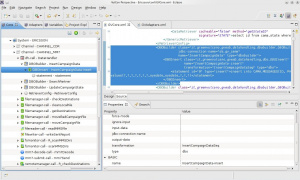Difference between revisions of "DBOInsert"
(→{{GVESB}} configuration) |
|||
| Line 5: | Line 5: | ||
=={{GVESB}} configuration== | =={{GVESB}} configuration== | ||
[[File:DBOInsert.jpg|thumb|DBOInsert with VulCon]] | [[File:DBOInsert.jpg|thumb|DBOInsert with VulCon]] | ||
| − | DBOInsert allows you to make | + | DBOInsert allows you to make insert data into the database. |
Each statement is identified by the id. | Each statement is identified by the id. | ||
Actions can be defined in two ways: | Actions can be defined in two ways: | ||
| − | Single execution of a statement | + | * Single execution of a statement |
| − | + | * Complex execution guided by XML | |
In the first modality any input is ignored and the code executes the first statement configured. | In the first modality any input is ignored and the code executes the first statement configured. | ||
In the second mode, the input XML (or its transformation) must contain the command (row) valid with all parameters (COL) required by the statement. | In the second mode, the input XML (or its transformation) must contain the command (row) valid with all parameters (COL) required by the statement. | ||
| − | |||
| − | |||
| − | |||
| − | |||
| − | |||
The following table shows the DBOInsert attributes: | The following table shows the DBOInsert attributes: | ||
| Line 57: | Line 52: | ||
</DBOBuilder> | </DBOBuilder> | ||
</syntaxhighlight> | </syntaxhighlight> | ||
| + | |||
| + | Might contain the following sub-elements: | ||
| + | * [[Description]] | ||
| + | * [[DHVariables]] | ||
| + | * [[statement]] | ||
Revision as of 11:19, 2 April 2012
Description
The DBOInsert element represents the DBO optimized for insert operations.
GreenVulcano® ESB configuration
DBOInsert allows you to make insert data into the database.
Each statement is identified by the id.
Actions can be defined in two ways:
- Single execution of a statement
- Complex execution guided by XML
In the first modality any input is ignored and the code executes the first statement configured.
In the second mode, the input XML (or its transformation) must contain the command (row) valid with all parameters (COL) required by the statement.
The following table shows the DBOInsert attributes:
| Attribute | Type | Description |
|---|---|---|
| type | fixed | This attribute must assume the value dbo |
| class | fixed | This attribute must assume the value it.greenvulcano.gvesb.datahandling.dbo.DBOInsert |
| name | required | DBOInsert name |
| transformation | optional | Transformation name |
| force-mode | optional | xml2db): Force mode of the DBO, can be used in DBOBuilder whit more heterogeneous DBO. Mode: caller - inherit the mode of the caller xml2db - data entry mode |
| jdbc-connection-name | optional | DataSource JNDI name. Override connection defined in DBOBuilder. |
| ignore-input | optional | false): Tell the engine do not use the input data. |
| input-data | optional | The default is the value of @name-Input. Can be set as the @output-data of a preceding DBO to use its output as input. |
| output-data | optional | The default is the value of @name-Output. |
For example:
<?xml version="1.0" encoding="UTF-8"?>
<DBOBuilder class="it.greenvulcano.gvesb.datahandling.dbobuilder.DBOBuilder" jdbc-connection-name="ds.gv_cama"
name="InsertCampaignData" type="dbobuilder">
<DBOInsert class="it.greenvulcano.gvesb.datahandling.dbo.DBOInsert" name="InsertCampaingDataInsert"
transformation="InsertCampaignDataSeq" type="dbo">
<statement id="0" type="insert">
insert into CAMA.MESSAGES(......) values(?,?,?,?,?,?,?,sysdate,sysdate,?,?,?)
</statement>
</DBOInsert>
</DBOBuilder>
Might contain the following sub-elements:
